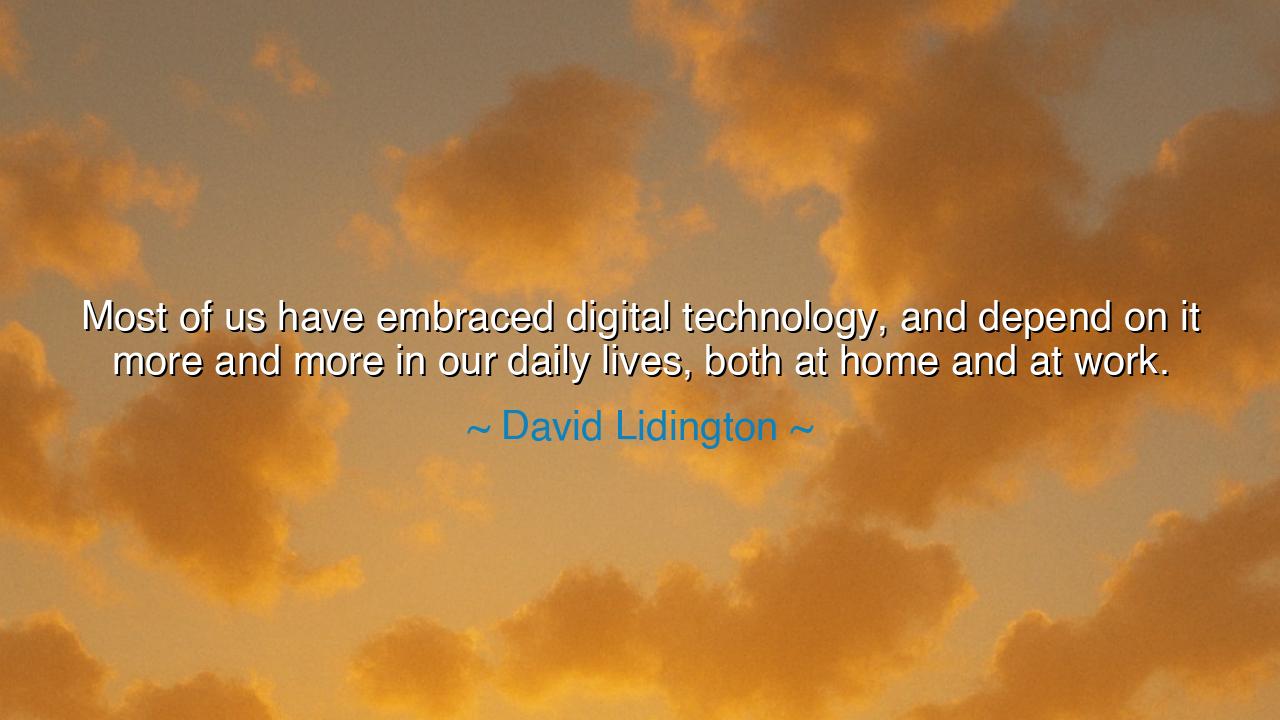
Most of us have embraced digital technology, and depend on it
Most of us have embraced digital technology, and depend on it more and more in our daily lives, both at home and at work.






In the councils of our age, a plain truth is spoken like a bell at dawn: “Most of us have embraced digital technology, and depend on it more and more in our daily lives, both at home and at work.” Hear how the words march—embraced, depend, daily—naming a bond that has grown from curiosity into covenant. Where once the loom and the plow ruled our hours, now the lattice of light—circuits, code, and silent signals—threads our waking and our rest. The sentence is not prophecy; it is inventory. It counts the hidden gears that turn our mornings on and dim our nights to sleep.
The ancients would have called such a force a household spirit—a genius of the hearth—because it dwells everywhere and nowhere. Digital technology warms the kettle and tallies the harvest; it carries letters swifter than arrows and stores memory deeper than parchment. In the marketplace it weighs the grain of commerce; in the academy it multiplies voices. We wear it on our wrists, we cradle it in our palms, and through it we weave countless invisible treaties with strangers we will never meet. So tightly has it wrapped our days that to be cut from it, even for a little while, feels like stepping outside the city walls without cloak or lamp.
Yet the sentence also hums with warning. To depend is to lean—and what we lean on must be strong. When the net frays, the modern village stumbles: traffic lights freeze, medicines wait, news turns to rumor, and the distant friend falls suddenly silent. Our forebears taught that every blessing has a shadow; the wheel that speeds the journey can also crush the inattentive foot. So it is with the glowing tools we love: they magnify our power and, if ungoverned, magnify our folly.
Consider a living parable from a small firm whose servers failed one winter’s morning. The team had calendars in the cloud, invoices in the cloud, even the door locks braided to a signal that went missing. For three hours, workers stood in the hallway, coffee cooling, brilliance idling—craftsmen outside their own workshop. When the systems returned, the leader gathered them and set three oaths: keep a paper map for the city, keep a local ledger for the work, and keep a rhythm of drills so surprise would become practice. Their tools were still digital, but their wisdom grew analog: backups, boundaries, and the courage to ask what if.
Or look farther back to the telegraph, that first electric vein across continents. It taught nations to speak in minutes rather than weeks—and taught them too how swiftly error could travel. One garbled code could misprice a cargo; one broken line could strand a rescue. Yet the world did not abandon the wire; it learned redundancy, etiquette, and repair. Our daily lives must learn the same. Let the phone be marvelous, not tyrant; let the platform be servant, not sovereign. The measure of a tool is whether it leaves us more human when we set it down.
The saying’s heart, then, is stewardship. If home is brighter for its smart lamps, let it also be kinder for its unhurried meals. If work is faster for its automation, let it also be truer for its accountability. Teach children that a library card and a search bar are cousins, not rivals; teach elders that a password is a key and must be kept as carefully as the front-door lock. The culture that forgets such small arts will find its great systems brittle.
Carry away these actions as provisions for the road. (1) Set times each day when digital technology rests and conversation reigns; this will remind the soul who is master. (2) Keep simple redundancies—printed contacts, a small cash reserve, a paper map—so dependence never becomes helplessness. (3) Practice digital hygiene as civic duty: strong passphrases, updates, backups, and the quiet courtesy of verifying before sharing. (4) At work, pair speed with sense—document decisions outside the tool that made them; audit the algorithm with human eyes. (5) At home, make a Sabbath for attention: a weekly hour when every screen sleeps and every face is seen. In these obediences, our embrace of the new does not erase the old virtues, and our dependence becomes partnership rather than chain.
So let the teaching be handed down: welcome the light that flows through wires, but keep a lamp of oil nearby; love the network, but remain a neighbor. For only then will the world of signals strengthen the world of souls, and the bright machinery we have built will carry us—not away from ourselves—but more deeply home.






AAdministratorAdministrator
Welcome, honored guests. Please leave a comment, we will respond soon